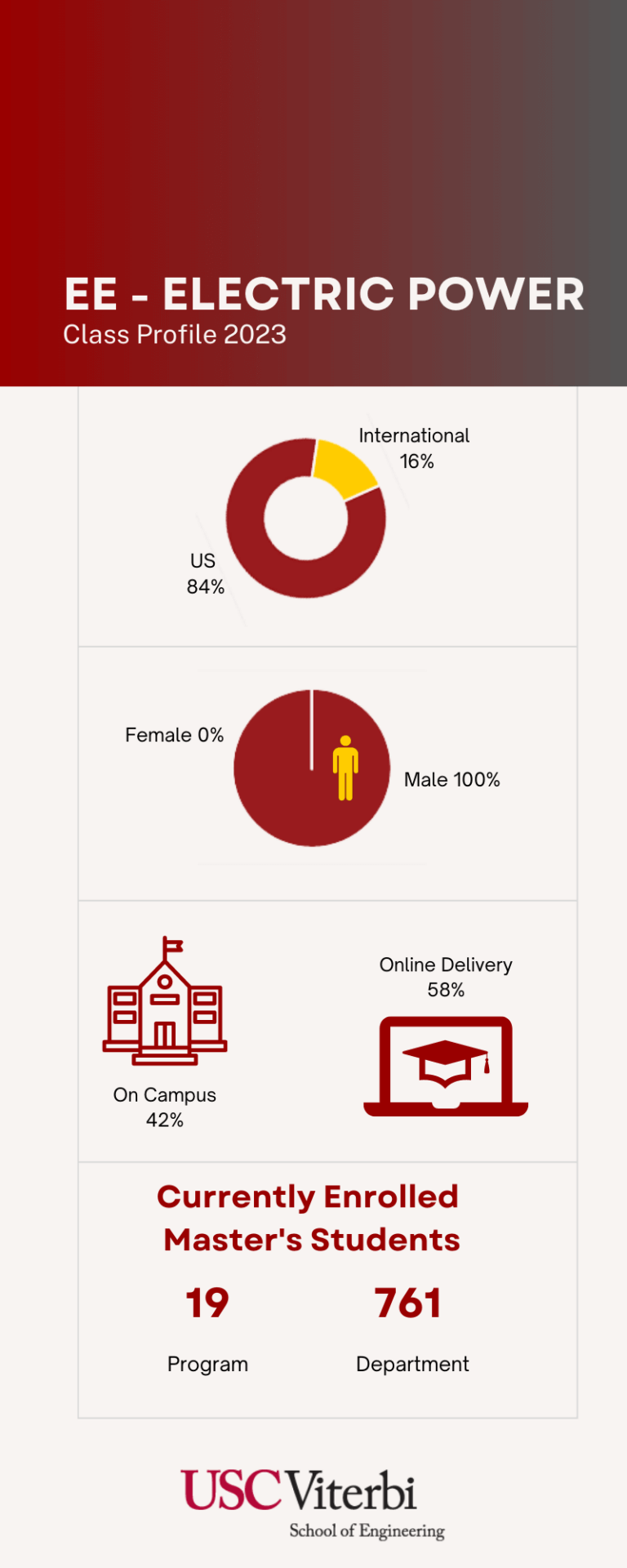The electric power industry is presently experiencing what has been described as the most revolutionary (and exciting) set of technological changes since the days of Edison. Apart from environmental pressures that demand a revised portfolio of energy resources, utilities are anticipating the development of a so-called “smart grid” that promises new opportunities for efficient and reliable use of electric power. The skills that electric power engineers will require are changing accordingly.
The MS in Electrical Engineering (Electric Power) is a program option for students seeking careers in the electric power industry. The plan of study combines traditional topics in power generation, transmission, and distribution with cutting-edge topics such as the integration of renewable energy sources in the “smart grid.”
APPLICATION DEADLINES
| SEMESTER | DEADLINE |
| Fall | December 15 |
Visit our Ready to Apply page for more information
ELIGIBILITY CRITERIA
Applicants to the master's of science programs in Electrical Engineering - Electric Power are required to have a bachelor’s degree or be in the process of completing a bachelor's degree. Degrees in any engineering or engineering-related disciplines are frequently represented among our program applicants, including but not limited to the following:
- Computer Science
- Electrical Engineering
- Electronics
- Math
- Physics
Applicants without a Bachelor’s degree in the preferred majors listed above will only be considered with coursework and demonstrated proficiency in the acceptable courses listed below (or equivalent).
|
Differential Equations
Linear Algebra
Probability/Statistics |
| Electrical Engineering |
| Linear Circuits |
| Linear Systems |
| Microprocessors |
| Physics |
Applications are reviewed holistically; simply taking these courses does not guarantee admission.
APPLICATION REQUIREMENTS
The following materials are required to be included with your online application:
- Transcripts
- Resume/CV
- Personal Statement
- Letter of Recommendation (Optional)
NOTE: The GRE is not required for 2025 applications.
The following link will take you to an overview of the tuition & fees for graduate engineering students, including payment information. Both on-campus and DEN@Viterbi students pay the same tuition
TUITION AND FEES OVERVIEW
Use the link below to download the Cost of Attendance to see a summary of tuition and fees by semester. The document is a typical example and the number of courses, and time to complete the program, will vary by student.
Estimated Cost of Attendance - 28 Unit Program
 WILLIAM LI
WILLIAM LI
What were the main reasons you chose to pursue this graduate program at USC?
I chose the program for its strength in its electrical engineering program while being in the heart of Los Angeles.
What are some personal achievements or experiences you’d like to share?
I was a former Apple engineer after my undergraduate before coming to pursue my graduate education at USC!
What do you like most about living in Los Angeles?
Los Angeles has been one of the most diverse cities I’ve ever lived in. The combination of food, people, and atmosphere has really made it a treat to live in the area
Alumni Employment - 2022*
(Companies & Job Titles)
* Information is based on a voluntary survey and should not be interpreted as a comprehensive view of the 2022 graduating class.
This program is also available online to professional engineers through DEN@Viterbi. Because the DEN@Viterbi program provides a fully equivalent academic experience, the degree a USC engineering student earns is the same whether they are on-campus or online.
If you are interested in beginning classes as a DEN@Viterbi student next semester, explore the requirements and steps to enrolling as a Limited Status Student.
Learn More About DEN@Viterbi
Detailed Program Curriculum and RequirementsSchedule of Classes
DEN@VITERBI ONLINE COURSE OFFERINGS
The following courses and program requirements serve as program planning for DEN@Viterbi students. Course offerings and availability are subject to change. Please consult with advisor if you have any questions.
| Required Courses |
| All Courses Required - 15 units total. |
| EE 443 | Introduction to Power Systems (4 units) |
| EE 444 | Power Systems Technology (4 units) |
| EE 521 | Power System Analysis and Design (4 units) |
| SAE 515 | Sustainable Infrastructure Systems (3 units) |
| Elective Courses |
| At least four courses required at least one from each area. |
| Transmission, Distribution, and Planning Area |
| CE 501 | Construction Practices (4 units) |
| EE 524 | Transients in Power Systems (3 units) |
| EE 525 | Power System Protection (4 units) |
| EE 526 | Renewable Energy in Power Systems (4 units) |
| High-Voltage Equipment and Design |
| EE 528 | Power Electronics (3 units) |
| Power-System Control and the Smart Grid |
| EE 527 | Net-Centric Power System Control (3 units) |
| EE 543aL | Digital Control Systems (3 units) |
| EE 585 | Linear System Theory (3 units) |
Please complete the following form for more information.



